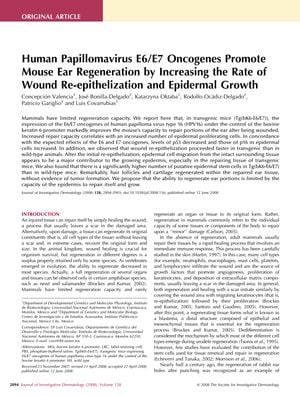Human Papillomavirus E6/E7 Oncogenes Promote Mouse Ear Regeneration by Increasing the Rate of Wound Re-Epithelization and Epidermal Growth
June 2008
in “
Journal of Investigative Dermatology
”

TLDR HPV genes in mice improve ear tissue healing by speeding up skin growth and repair.
The study from December 1, 2008, demonstrated that the expression of human papillomavirus (HPV) E6/E7 oncogenes in transgenic mice (Tg(bK6-E6/E7)) led to improved ear tissue regeneration following injury. This improvement was characterized by faster wound re-epithelization, increased epidermal cell proliferation, decreased p53 protein levels, and increased p16 protein levels. The transgenic mice also had a higher number of putative epidermal stem cells and were able to regenerate hair follicles and cartilage without tumor formation. The study concluded that the expression of E6/E7 oncogenes enhances the regenerative capacity in mice by promoting the proliferation of epidermal precursor cells, which is crucial for ear regeneration. The number of mice used in parts of the study was specified, with 14 wild-type and 16 transgenic mice in the re-epithelization analysis, but the total number of mice used in the entire study was not provided.


